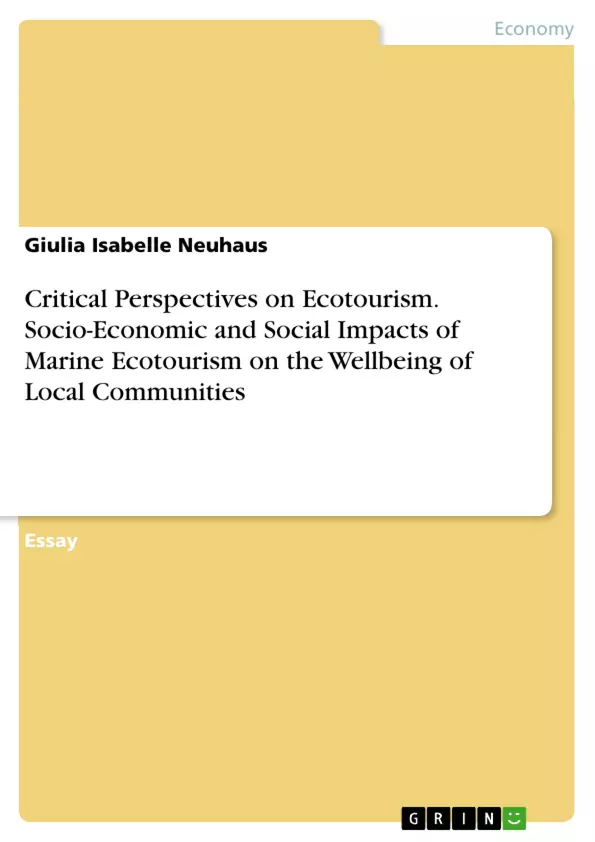This review essay aims to synthesise the current understanding of socio-economic and social impacts of marine ecotourism on the wellbeing of local communities by discussing the findings presented in recent empirical research papers. This review considers studies conducting economic impact evaluations on shark diving and whale watching, as well as social impact studies of tourism development in protected areas.
Firstly, the key findings of empirical case studies are presented and analysed, focusing on how these argue for the marketization of marine resources through ecotourism either as a development opportunity or as a means for species conservation. This is followed by an analysis on how this form of environmental governance involves novel forms of power between communities and government institutions. This review argues that marine ecotourism as a means of neoliberal conservation presents opportunities as well as constraints for environmental justice.
Inhaltsverzeichnis (Table of Contents)
- Introduction
- Socio-Economic Opportunities of Marine Ecotourism
- Ecotourism: The Holy Grail for Community Development?
- Conclusion
Zielsetzung und Themenschwerpunkte (Objectives and Key Themes)
This review essay synthesizes the current understanding of the socio-economic and social impacts of marine ecotourism on the well-being of local communities. It examines the findings of recent empirical research papers, focusing on the marketization of marine resources through ecotourism. This review aims to understand how ecotourism as a form of neoliberal conservation presents opportunities and constraints for environmental justice.
- The potential of marine ecotourism to generate socio-economic benefits for coastal communities.
- The impact of marine ecotourism on the livelihoods and well-being of local communities.
- The role of marine ecotourism in conservation efforts and the management of marine resources.
- The implications of neoliberal conservation approaches for environmental justice in coastal areas.
- The importance of considering the wider context and site-specific characteristics when evaluating the potential of ecotourism.
Zusammenfassung der Kapitel (Chapter Summaries)
- Introduction: This chapter provides an overview of the current landscape of marine resource management, highlighting the challenges of balancing competing stakeholder interests and conservation needs. It introduces marine ecotourism as a potential market-based solution for biodiversity conservation and community development. However, it also acknowledges the potential challenges associated with its implementation and the need to critically examine its impact on local communities.
- Socio-Economic Opportunities of Marine Ecotourism: This chapter explores the potential of whale watching and shark diving as alternative livelihoods for coastal communities. It examines the economic benefits associated with these activities, considering direct and indirect expenditures, as well as the potential for leakages and inequitable distribution of income. The chapter also highlights the importance of effective resource management and the inclusion of local communities in ecotourism initiatives.
Schlüsselwörter (Keywords)
Marine ecotourism, socio-economic impacts, local communities, environmental justice, neoliberal conservation, whale watching, shark diving, economic impact evaluation, resource management, community development, alternative livelihoods, protected areas.
Frequently Asked Questions
What is marine ecotourism?
It involves tourism activities centered on marine life, such as whale watching and shark diving, aimed at conservation and community development.
How does ecotourism benefit local communities?
It can provide alternative livelihoods, generate income through direct expenditures, and support the management of local protected areas.
What are the risks of marine ecotourism?
Potential risks include the inequitable distribution of income, "leakages" where profits leave the local area, and novel forms of power imbalances between communities and governments.
What is "neoliberal conservation"?
It is an approach that uses market-based mechanisms and the marketization of natural resources as a means for species conservation and environmental governance.
Does ecotourism always promote environmental justice?
Not necessarily. The review argues that while it presents opportunities, it can also impose constraints on environmental justice depending on how it is governed.
- Arbeit zitieren
- Giulia Isabelle Neuhaus (Autor:in), 2020, Critical Perspectives on Ecotourism. Socio-Economic and Social Impacts of Marine Ecotourism on the Wellbeing of Local Communities, München, GRIN Verlag, https://www.grin.com/document/991981



